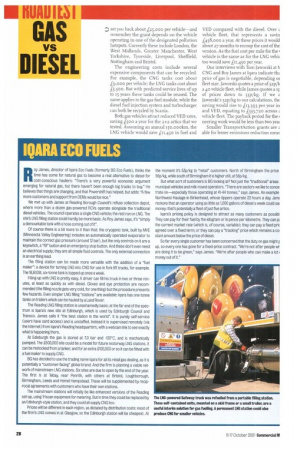II)ARA ECU FUELS
Page 28

If you've noticed an error in this article please click here to report it so we can fix it.
Roy James, director of lqara Eco Fuels (formerly BG Eco Fuels), thinks the time has come for natural gas to become a real alternative to diesel for cost-conscious hauliers; "There's a very powerful economic argument emerging for natural gas, but there haven't been enough big trucks to buy." He believes that things are changing, and that Powershift has helped, but adds: "A few more customers and support from OEMs would be nice."
We met up with James at Reading Borough Council's refuse collection depot, where more than a dozen gas-powered RCVs operate alongside the traditional diesel vehicles, The council operates a single CNG vehicle; the rest run on LNG. The site's LNG filling station could hardly be more basic. As Roy James says, it's "simply a demountable tank with a hose coming out of it".
Of course there is a bit more to it than that: the cryogenic tank, built by MVE (Minnesota Valley Engineering) includes an automatically operated evaporator to maintain the correct gas pressure (around 12 bar), but the only controls on it are a keyswitch, a "fill" button and an emergency stop button. And these don't even need an electrical supply; they are all simple fluid controls. The only external connection is an earthing lead.
The filling station can be made more versatile with the addition of a 'fuel maker": a device for turning LNG into CNG for use in fork-lift trucks, for example. The 18,600rd, six-tonne tank is topped up once a week.
Filling-up with LNG is pretty easy. A driver can fill his truck in two or three minutes, at least as quickly as with diesel. Gloves and eye protection are recommended (the filling nozzle gets very cold, for one thing) but the procedure presents few hazards. Even simpler LNG filling "stations" are available: lqara has one-tonne tanks on trailers which can be hauled by a Land Rover.
The Reading LNG filling station is unashamedly basic; at the far end of the spectrum is lqara's new site at Edinburgh, which is used by Edinburgh Council and Transco. James calls it "the best station in the world". It is purely self-service (users have card access) and is unstaffed. Instead it is supervised remotely (via the Internet) from lqara's Reading headquarters, with a webcam link to see exactly what is happening there.
At Edinburgh the gas is stored at 7.0 bar and -130°C, and is mechanically pumped. The 2500,000 site could be a model for future motorway LNG stations. It can be restocked from a tanker, and for an extra 2100,000 or so it can be fitted with a fuel maker to supply CNG.
BG has decided to use the trading name lqara for all its retail gas dealing, as it is potentially a "customer-facing" global brand. And the firm is planning a viable network of mainstream LNG stations. Six sites are due to open by the end of the year. The first is at Tebay, near Penrith, with others at Bristol, Loughborough, Birmingham, Leeds and Hemel Hempstead. These will be supplemented by reciprocal agreements with customers who have their own stations.
The mainstream stations will initially be like enhanced versions of the Reading set-up, using Triscan equipment for metering. But in time they could be replaced by an Edinburgh-style station, and they could all supply CNG too.
Prices will be different in each region, as dictated by distribution costs: most of the firm's LNG comes in at Glasgow, so the Edinburgh station will be cheapest. At the moment it's 53p/kg to "retail" customers. North of Birmingham the price 56p/kg, while south of Birmingham it is higher still, at 58p/kg.
But what sort of customers is BG looking at? Not just the 'traditional" areas municipal vehicles and milk-round operators. "There are sectors we like to conce trate on—especially those operating at 41-44 tonnes," says James. An example Northwest Haulage in Birkenhead, whose tippers operate 22 hours a day. Jam( reckons that an operator using as little as 1,000 gallons of diesel a week could sal money: that's potentially a fleet ofjust five artics.
lqara's pricing policy is designed to attract as many customers as possibt They can pay for their fuel by the kilogram or in pence per kilometre. They can fx the current market rate (which is, of course, variable); they can pay a fixed prit agreed over a fixed term; or they can pay a "tracking" price which remains a on stant amount below the price of diesel.
So far every single customer has been concerned that the duty on gas might up, so every one has gone for a fixed-price contract. 'We're not after people wt' are doing it to be green," says James. "We're after people who can make a lot ( money out of it."








































































































































